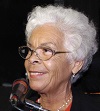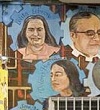Freedom Archives Productions
These materials were used in various Freedom Archives productions released between 2000 and 2013.
Subcollections
- Compact discs and videos representing digitized copies of analog tapes
-
Freedom is a Constant Struggle
The Freedom Is A Constant Struggle collection extends from February 1976 to August 1995. It continues the weekly summary of international, national, and local struggles on many fronts, interspersed with poetry and music. - General materials
-
La Lucha Continua: a talking mural in San Francisco
"La Lucha Continua/The Struggle Continues" is the result of a 3 year collaboration between Susan Greene and Freedom Archives. -
Materials Recorded and Gathered for "Wild Poppies"
Poetry and spoken word by activists, poets, and political prisoners. - Materials shot and gathered for the making of “Charisse Shumate: Fighting for our Lives”
- Materials shot and gathered for the making of “Legacy of Torture”
- Paul Robeson recordings
- Video materials shot and collected in the making of Cointelpro 101
- COINTELPRO 101 Raw Materials
Documents
4 Documents Found
Call Number: CD 006Format: CDCollection: Compact discs and videos representing digitized copies of analog tapes
Compilation CD from LPs (see track information for details)
Date: 5/23/1994Call Number: KP 118Format: CassetteProducers: NBCProgram: Phil Donahue ShowCollection: General materials
Dr. Khalid Abdul Muhammad appeared on The Phil Donahue Show, a nationally aired daytime talk show, after Muhammad was publically penalized by the mass media about his comments and book on the relationship between the Black and the Jewish populations historically in the world. The show emphasizes the one sided picture of mainstream television with the hostility he receives from the host, Phil Donahue. Donahue constantly badgers Muhammad with miniscule questions and talks down to him when he answers them with a more general overview of a situation. There is little interviewing that occurs, rather it is a situation where Donahue is constantly attacking Muhammad, and Muhammad is cleverly answering and pointing out the flaws in Donahue’s argument. Some of the topics which Muhammad does briefly touch upon are: Jesse Jackson, Nelson Mandela, Black Liberation, Black Unity, South Africa, Coleman Ferguson, and the Nation of Islam.
Date: 5/11/1974Call Number: KP 480Format: Cass A & BProducers: University of California Extension Media CenterProgram: Arab World: Its People & CultureCollection: General materials
Dr. Dols conceptualizes the history of Middle East during the 7th century and late 6th century through Muhammad, the Mosque, & the Mamluks. He discusses the development of the Islamic State and the notions of "Islamization," and "Arabization."
Date: 5/11/1974Call Number: KP 481Format: Cass A & BProducers: University of California Extension Media CenterProgram: Arab World: Its People & CultureCollection: General materials
Dr. Simpson discusses the Arab governments' desire to "modernize" Arab States. He argues that Arab peoples are culturally traditional and that modernism (as in Europe and North America) would cause much dissatisfaction. He claims that modernizing would force the restructuring of Islam, and destroy the Arab family unit.
Cites a number of different reasons why the push for modernism would be damaging and difficult to obtain (population control, lack of capital).
4 Documents Found




